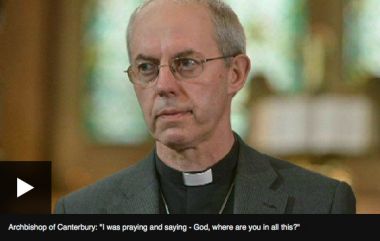Did Justin Welby really doubt the existence of God after Paris attacks?

The Archbishop of Canterbury yesterday admitted that the Paris terror attacks had caused him to wonder what God was doing. In a thoughtful and honest Songs of Praise interview he said: "Saturday morning, I was out and as I was walking I was praying and saying: 'God, why – why is this happening? Where are you in all this?' And then engaging and talking to God."
So far, so unremarkable. However, he also had the temerity to use the 'd-word' – "Yes, I doubt."
The predictable headlines ensued: "Paris attacks made me 'doubt' presence of God, admits Archbishop", "Archbishop of Canterbury Justin Welby says 'I doubted God'", Welby "admits 'doubt' over God's presence after tragedy".
At one level, this is just another example of the mainstream media's well-documented religious illiteracy and not-so-subtle secularist bias. Most right-thinking people, the implication runs, have long understood that the existence of evil and suffering is a knock-down argument against the existence of a good God, and now the Archbishop of Canterbury is seeing the light as well. For the avoidance of doubt (see, there it is again) Welby didn't say that he doubted God's existence, but that he was unclear about the nature of His involvement in this particular event.
Since the d-word so easily generates unwelcome headlines suggesting that the leader of worldwide Anglicanism isn't too sure of the whole faith thing, he'd probably be better off not using it in future. But when we look behind the headlines to what he was actually saying, we find a rich quality of thinking that enriches our discipleship.
Speaking very personally, the Archbishop was acknowledging that some events have the capacity to knock us off our theological balance. They confront us with the reality of human wickedness, which can for a while seem so much more powerful than goodness. The scale of the collected grief of the bereaved and injured is overwhelming. Doubt is not, in fact, a bad word to express the sense of dislocation that exposure to such trauma can create.
In this sense, doubt is a frequent and honourable scriptural theme, found in Job and the Psalms. These are books full of questions: God, where are you? I don't understand – what are you doing? "My bones suffer mortal agony as my foes taunt me, saying to me all day long, 'Where is your God?'" (Psalm 42:10); "Why do you hide your face and forget our misery and oppression?" (Psalm 44:24). It's in that context that the Archbishop's 'admission' was made. This is the natural and scriptural language of faith, not for a moment an indication that Justin Welby is on the point of becoming a disciple of Dawkins.
On that level, doubt is something we should all be open to – and yes, sometimes it may mean examining whether we are able to hold on to the most fundamental tenet of all, that there is a God in the first place. Doubt does mean continually testing the coherence and explanatory power of our faith against the harshest realities of human wickedness. It means refusing to offer glib and thoughtless responses to complex questions. It means being willing to expose our churchly certainties to the test of experience, and being forced to think harder than we would ever wish to about where God is in tragedy – precisely what Justin Welby was doing on his morning walk after the Paris attacks.
His answer, he told his Songs of Praise interviewer, was "in the middle of it". He also referred to Psalm 56:8, where the Psalmist says, "He stores up our tears in a bottle": "None of our sufferings are lost," he said.
It is possible to have too much faith, or at least, too much of the wrong kind of faith. When we simplify events to make them easier to understand or to bear – as we might by imagining the Paris attacks as demonically-inspired, or all the fault of Islam, for example – we are closing our ears to a much more profound conversation with God. We should be thankful that the Archbishop is able to help us to overhear it.
Follow @RevMarkWoods on Twitter.











